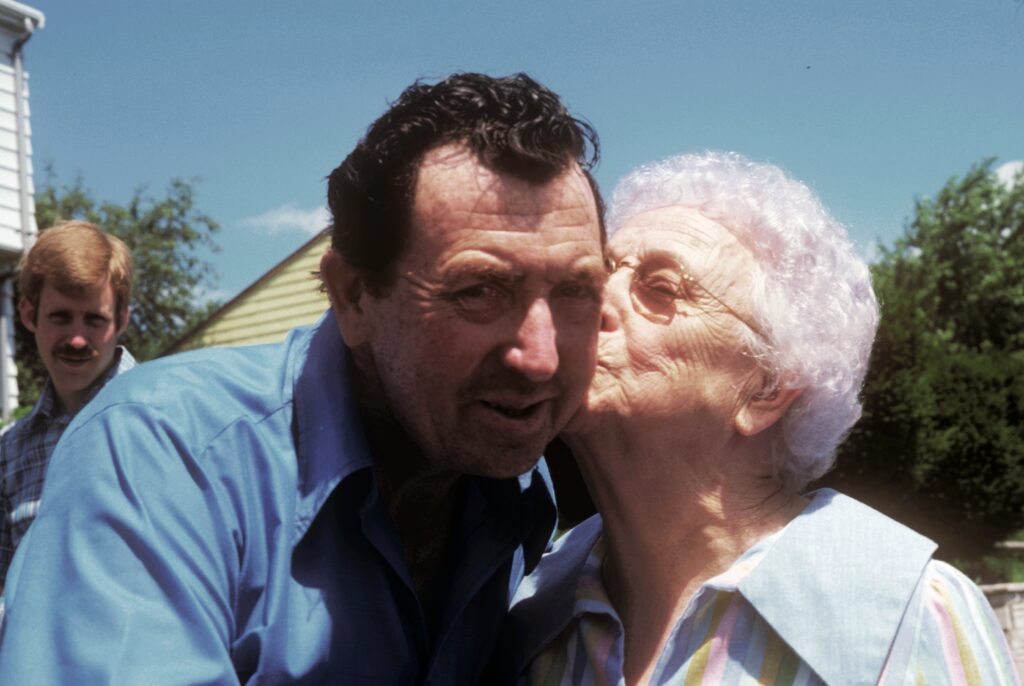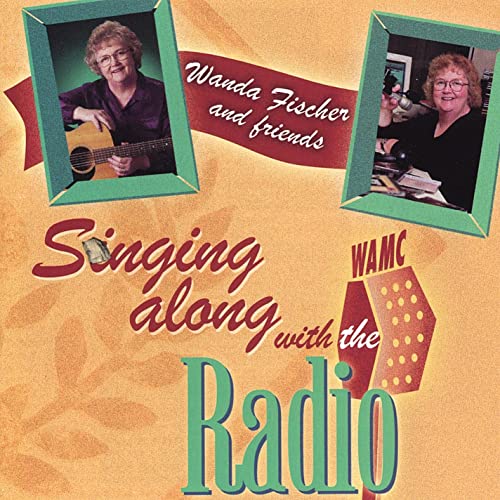
My late father, Giles Adams, with his mother, Maude Adams, in 1976–the only time she ever visited my family in Massachusetts.
My (late) later was a hillbilly. He would have told you so if you’d have had the opportunity to meet him.
He was proud of where he came from–southwestern Virginia. Born in 1926 in a place called Mendota, he was raised “up the holler” in Scott County, Virginia, in a log cabin that didn’t have indoor plumbing until I was sixteen years old. His father farmed tobacco, while his mother raised chickens and grew tomatoes, beans, corn, and other vegetables to keep the family fed. The red-clay soil somehow was fertile enough to keep food on the table.
Mostly.
My father learned at a young age how to hunt squirrels and pheasants to add meat to the family’s meals. He became an excellent marksman during those days. They basically had little to spare, so when my father had the opportunity to join President Franklin D. Roosevelt’s Civilian Conservation Corps at Virginia Tech in Blacksburg, Virginia, he jumped at the chance. No wonder FDR was known as “the poor man’s friend.”
In the CCCs, he didn’t have to shoot squirrels or pheasants any more. He and his CCC colleagues had meals provided while they learned new skills, and, unbeknownst to them, prepared for war.
Charles Lindbergh led an “America First” movement to convince the American people to stay out of the European conflict. While my father was in Blacksburg, he received a letter from one of his friends back home. That missive was written on a notecard sporting an “America First” message. (I still have that notecard. I consider it a piece of history.)
After Pearl Harbor Day on December 7, 1941, he and his CCC colleagues wanted to join the military to defend the United States. My father and several of his CCC colleagues lied about their ages in order to joined the armed forces. Despite the fact that he couldn’t swim, my father joined the U.S. Navy. He was only seventeen in 1943, but he told the recruiter that he was eighteen.
He met my mother when his ship was in Boston. She was from Beantown, and he, of course, was a hillbilly from southwestern Virginia.
I’m remembering my father the hillbilly now because I’m thinking about the faux hillbilly who’s joined Donald Trump on the Republican ticket as a candidate for vice president of the United States. J.D. Vance wrote a best-selling book several years ago called Hillbilly Elegy, in which he discussed his background of having grown up in Appalachia. His mother was a drug addict; he was essentially raised by his grandparents–Mamaw and Papaw–in Kentucky. He discussed the economic issues in Appalachia, as well as the loss of industries and the increase in addiction. He also deemed people in those areas who don’t “pull themselves up by their bootstraps” as lazy, especially since JD Vance himself went to college and then on to Yale Law School. He then became an attorney and a venture capitalist.
And now–a candidate for vice-president of the United States! Talk about pulling himself up by his bootstraps!
My hillbilly father pulled himself up by non-existent bootstraps. It wasn’t easy. But it took the fact that he married a woman from the north to do it. He returned from the Navy to southwestern Virginia to a place of no jobs, no opportunity, but to a place where moonshine was plentiful, as were so many of his old buddies from high school (which he never finished, by the way), and they were happy to get together, drink moonshine, and maybe, just maybe for get about what they’d seen and experienced during World War II.
Plenty of jobs existed in the north, where my mother came from. She threatened to leave him, taking with him the baby (me), unless he accompanied her to Boston. He decided to forego the moonshine and find a job.
But every year, we spent two weeks in southwestern Virginia with his family, where they. tried to convert me to their way of life. Canning beans. Making quilts. Knitting socks. Catching crawfish in the creek. Hiking up Clinch Mountain.
The one thing I always loved to do, though, was listen to music from the Appalachian mountains. Sometimes members of the Carter Family would visit and regale us with songs, both those associated with their family and with the area. If it were only the music and not the domestic chores they wanted me to learn, I would have been happy for those two weeks every year. I was constantly hot in the humidity without even a fan, and when the notorious thunderstorms rolled down the mountains, with piercing rain hitting my aunt’s tin roof, I always thought that relief from the heat would come. It never did.
My hillbilly father sometimes seemed like a fish out of water when we were in North Weymouth, Massachusetts, but when he was in southwestern Virginia, he was home. His southern drawl returned. He laughed more. But he was a realist. He knew there was nothing for him, vis-a-vis ways to make a living. Maybe he learned something when he was in the CCCs. He had a modest salary while there, which he sent home to his mother. He had a dry bed and food in the cafeteria. That meant something back in those just-post-Depression days.
I wish JD Vance had met my father. My father was a real hillbilly. He would have told you that himself. My father didn’t go to Yale on a nearly-full scholarship. He graduated from the school of hard knocks. And the Civilian Conservation Corps. You know, that organization started by Franklin Delano Roosevelt? The poor man’s friend?
My parents were both Republicans. I swear, they were the only two people I knew in Massachusetts who voted for Nixon when he ran against John F. Kennedy in 1960. Everyone else was JFK, all the way. My parents always thought it was “my country, right or wrong.” Neither graduated from high school, but both were intelligent and hard-working.
Yes, JD Vance got out of Appalachia. My father did, too. But instead of working for a venture capital firm and making gobs and wads of money, my father worked with his hands–in shipyards, on construction crews, in rain, snow, extremes of temperature, you name it. When there was no work to be had in Massachusetts, he left home for weeks at a time, going to where the work was: Nova Scotia, Newfoundland, Kansas City, Milwaukee, wherever something needed to be built for any company who’d hire him. He was a union worker (Wharf and Bridge Carpenters, Local 56). He also took on extra work on weekends, working as a construction diver (a skill he learned in the Navy) at the Chelsea Navy Yard.
Was he perfect? No. He still made moonshine in our backyard in North Weymouth. (Bet the “revenoooers” would be surprised at that–they were still looking for him in southwestern Virginia!). He still loved that music he yearned to hear back in his home town–that of the Carter Family, some of whom were his friends at the high school from which he never graduated.
I look at JD Vance, who’s supposed to represent the “working people” of this country because of where he was born, where he came from, how he got out, how he dealt with an addicted mother, and how his grandparents raised him. A working man? Please. He wrote a best-selling book debasing people from a geographic area, yet he offered no solutions to the problems his neighbors faced then and still face now. In his call for women to have more babies, does he propose more day care or more material/child health care to provide for those babies? No. Does he call for a child tax care credit to help with the day-to-day needs? No.
Meanwhile, he and his Yale-educated wife (who seems to me to be an accomplished, intelligent woman, by the way) have enough money to hire help when they need it to care for their children. When he was declared the candidate for vice president, she quite her lucrative positive at a high-powered law firm to support him.
I envision my (late) father putting his arm around Vance’s shoulder and saying, “Son…you got a lotta things to learn about folks like me…”
If only if could happen…


0 Comments